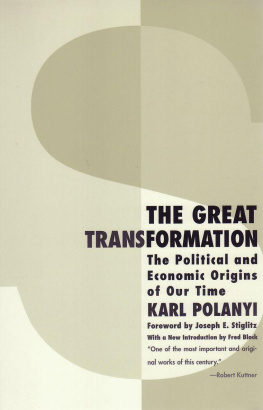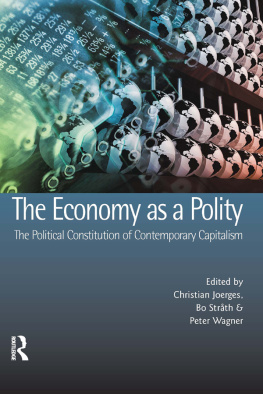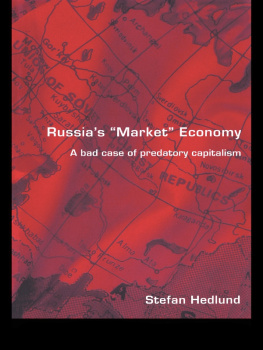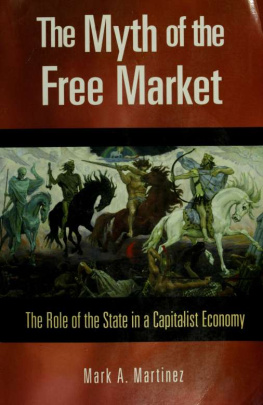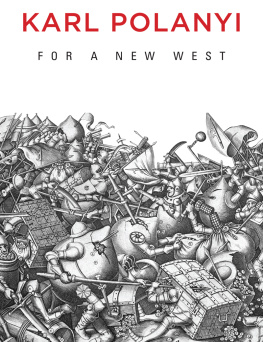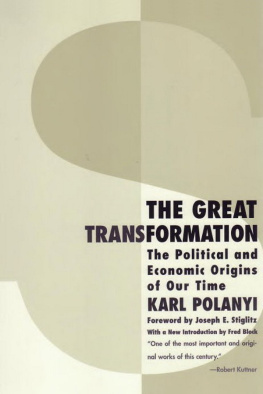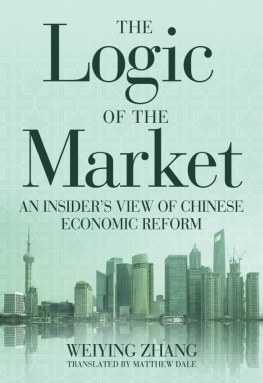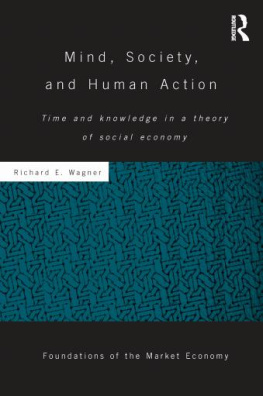Karl Polanyi
The G reat
Transformation
The Political and
Economic Origins
of Our Time
F O R E W O R D B Y
Joseph E. Stiglitz
I N T R O D U C T I O N B Y
Fred Block
B E A C O N P R E S S B O S T O N
To my beloved wife
Ilona Duczynska
I dedicate this book
which owes all to her help and criticism
Contents
I. Satanic Mill
II. Self-Protection of Society
[ Joseph E. Stiglitz ]
I t is a pleasure to write this foreword to Karl Polanyis classic book describing the great transformation of European civilization from the preindustrial world to the era of industrialization, and the shifts in ideas, ideologies, and social and economic policies accompanying it. Because the transformation of European civilization is analogous to the transformation confronting developing countries around the world today, it often seems as if Polanyi is speaking directly to present-day issues. His argumentsand his concernsare consonant with the issues raised by the rioters and marchers who took to the streets in Seattle and Prague in 1999 and 2000 to oppose the international financial institutions. In his introduction to the 1944 first edition, written when the IMF, the World Bank, and the United Nations existed only on paper, R. M. Maclver displayed a similar prescience, noting, Of primary importance today is the lesson it carries for the makers of the coming international organization. How much better the policies they advocated might have been had they read, and taken seriously, the lessons of this book!
It is hard, and probably wrong even to attempt to summarize a book of such complexity and subtlety in a few lines. While there are aspects of the language and economics of a book written a half century ago that may make it less accessible today, the issues and perspectives Polanyi raises have not lost their salience. Among his central theses are the ideas that self-regulating markets never work; their deficiencies, not only in their internal workings but also in their consequences (e.g., for the poor), are so great that government intervention becomes necessary; and that the pace of change is of central importance in determining these consequences. Polanyis analysis makes it clear that popular doctrines of trickle-down economicsthat all, including the poor, benefit from growthhave little historical support. He also clarifies the interplay between ideologies and particular interests: how free market ideology was the handmaiden for new industrial interests, and how those interests used that ideology selectively, calling upon government intervention when needed to pursue their own interests.
Polanyi wrote The Great Transformation before modern economists clarified the limitations of self-regulating markets. Today, there is no respectable intellectual support for the proposition that markets, by themselves, lead to efficient, let alone equitable outcomes. Whenever information is imperfect or markets are incompletethat is, essentially alwaysinterventions exist that in principle could improve the efficiency of resource allocation. We have moved, by and large, to a more balanced position, one that recognizes both the power and the limitations of markets, and the necessity that government play a large role in the economy, though the bounds of that role remain in dispute. There is general consensus about the importance, for instance, of government regulation of financial markets, but not about the best way this should be done.
There is also plenty of evidence from the modern era supporting historical experience: growth may lead to an increase in poverty. But we also know that growth can bring enormous benefits to most segments in society, as it has in some of the more enlightened advanced industrial countries.
Polanyi stresses the interrelatedness of the doctrines of free labor markets, free trade, and the self-regulating monetary mechanism of the gold standard. His work was thus a precursor to todays dominant systemic approach (and in turn was foreshadowed by the work of general equilibrium economists at the turn of the century). There are still a few economists who adhere to the doctrines of the gold standard, and who see the modern economys problems as having arisen from a departure from that system, but this presents advocates of the self-regulating market mechanism with an even greater challenge. Flexible exchange rates are the order of the day, and one might argue that this would strengthen the position of those who believe in self-regulation. After all, why should foreign exchange markets be governed by principles that differ from those that determine any other market? But it is also here that the weak underbelly of the doctrines of the self-regulating markets are exposed (at least to those who pay no attention to the social consequences of the doctrines)! For there is ample evidence that such markets (like many other asset markets) exhibit excess volatility, that is, greater volatility than can be explained by changes in the underlying fundamentals. There is also ample evidence that seemingly excessive changes in these prices, and investor expectations more broadly, can wreak havoc on an economy. The most recent global financial crisis reminded the current generation of the lessons that their grandparents had learned in the Great Depression: the self-regulating economy does not always work as well as its proponents would like us to believe. Not even the U.S. Treasury (under Republican or Democratic administrations) or the IMF, those institutional bastions of belief in the free market system, believe that governments should not intervene in the exchange rate, though they have never presented a coherent and compelling explanation of why this market should be treated differently from other markets.
The IMFs inconsistencieswhile professing belief in the free market system, it is a public organization that regularly intervenes in exchange rate markets, providing funds to bail out foreign creditors while pushing for usurious interest rates that bankrupt domestic firmswere foreshadowed in the ideological debates of the nineteenth century. Truly free markets for labor or goods have never existed. The irony is that today few even advocate the free flow of labor, and while the advanced industrial countries lecture the less developed countries on the vices of protectionism and government subsidies, they have been more adamant in opening up markets in developing countries than in opening their own markets to the goods and services that represent the developing worlds comparative advantage.
Today, however, the battle lines are drawn at a far different place than when Polanyi was writing. As I observed earlier, only diehards would argue for the self-regulating economy, at the one extreme, or for a government run economy, at the other. Everyone is aware of the power of markets, all pay obeisance to its limitations. But with that said, there are important differences among economists views. Some are easy to dispense with: ideology and special interests masquerading as economic science and good policy. The recent push for financial and capital market liberalization in developing countries (spearheaded by the IMF and the U.S. Treasury) is a case in point. Again, there was little disagreement that many countries had regulations that neither strengthened their financial system nor promoted economic growth, and it was clear that these should be stripped away. But the free marketeers went further, with disastrous consequences for countries that followed their advice, as evidenced in the recent global financial crisis. But even before these most recent episodes there was ample evidence that such liberalization could impose enormous risks on a country, and that those risks were borne disproportionately by the poor, while the evidence that such liberalization promoted growth was scanty at best. But there are other issues where the conclusions are far from clear. Free international trade allows a country to take advantage of its comparative advantage, increasing incomes on average, though it may cost some individuals their jobs. But in developing countries with high levels of unemployment, the job destruction that results from trade liberalization may be more evident than the job creation, and this is especially the case in IMF reform packages that combine trade liberalization with high interest rates, making job and enterprise creation virtually impossible. No one should have claimed that moving workers from low-productivity jobs to unemployment would either reduce poverty or increase national incomes. Believers in self-regulating markets implicitly believed in a kind of Says law, that the supply of labor would create its own demand. For capitalists who thrive off of low wages, the high unemployment may even be a benefit, as it puts downward pressure on workers wage demands. But for economists, the unemployed workers demonstrate a malfunctioning economy, and in all too many countries we see overwhelming evidence of this and other malfunctions. Some advocates of the self-regulating economy put part of the blame for these malfunctions on government itself; but whether this is true or not, the point is that the myth of the self-regulating economy is, today, virtually dead.
Next page
